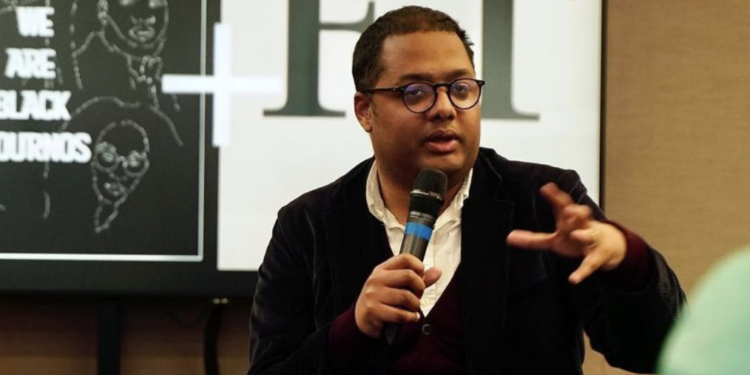Stephen Bush is an associate editor and columnist at the Financial Times, writing a daily newsletter on UK politics and policy, as well as a wide-ranging weekly column. He was one of the three panellists at the WABJ+FT event in April 2023, titled Employment Progression with the Financial Times. Here he answers a few questions about the event, his career and his take on the industry.
What was the most interesting question you were asked at the WABJ?
It was when people asked me about representation of men in the industry because the second I was asked it, I thought, ‘Oh, that is actually important.’ It was just really interesting to get that sense of the industry, not quite from the outside but how people less far along in their careers view it. It is always oddly useful, when you are far along in your career, to realise the things you are becoming out of touch with.
What advice would you give to someone wanting to become a columnist?
Be something else first, whether it is a reporter or someone who set up a business or something senior in politics.
Although there are people who go in from a very young age, they almost invariably, when they are young, write about their sex life. Then they are 30-something writing about their divorce, and then being made redundant at 40. Having to do that kind of confessional is quite limiting. You run out life material and it’s quite exposing. I think often people who go through that route end up disclosing things they later regret.
Things I find useful are the expertise from having covered politics in the day to day, when I was doing the blogging beat. And also, actually having been a comment editor for a bit is really useful because it just gives me a better perspective.
Basically, do something else, even if it is in the opinion family, like the analysis beat in politics or features journalism. Just having that as your route into the column is much better and more sustainable than trying to start in that beat right away.
What was something interesting you learned from one of the other speakers?
Actually, the thing I learned that was really fascinating for me was from [fellow panellist and FT colleague] Elizabeth Pears. That Gary Younge got his start, in part, because of conversations about diversity that happened after the murder of Stephen Lawrence. That was a bit of British political and media history I didn’t know about and I just found it really interesting.
What was one set back that you had in your career and how did you recover from it?
For me, my biggest setback is, sadly, a very universal experience in journalism. I was actually lucky it didn’t happen directly to me, but my boss Ben Brogan, who was fired at The Telegraph.
I had been working on The Telegraph helping him with his morning email. And obviously if the person you’ve been helping is sacked, you think, ‘Ok, well this can’t be good for me in the long term either.’ And I think the way I got through it is, I took the view that I couldn’t control whether or not I would be got rid of in the way he had been. The one thing I could do was focus on trying to do as good a job as possible every day. I thought ‘OK, I am just going to focus on this being the best shop window for me it can possibly be, by making this email as good as it possibly be.’
What is one skill you often use in your current role that you didn’t think you would?
Definitely Excel spreadsheets. I really didn’t think I would be using and getting ideas from spreadsheets as much as I do. When I was at the New Stateman doing counters of, say, the Brexit votes or Labour CLPs, I thought ‘Well, if I stop doing newsy stuff, I’ll stop doing this,’ but actually there is just loads and loads of use I get as a columnist from using Excel.
What are the three most important hard or soft skills you think every journalist should have or hone?
One, personability. You have to get people to feel comfortable about telling you stuff. I don’t think there is one way of doing this but you have to be able to put people at ease.
Two, resilience. Almost everything I’ve ever written wasn’t as good on the page as in my head, but you have to keep going. More importantly, you will have stories that you can’t stand up, legal threats, people getting angry with what you’ve written, and the job can be pretty insecure. You’ve got to have the ability to keep going.
Three, a basic familiarity with the law. You need to be able to avoid getting sued but also you need to be able to have a proper conversation with the lawyers from time to time.

